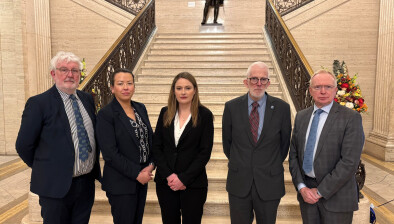NI: High Court: Excessive post-adoption contact plan was not in the interests of children
A Trust in Northern Ireland which agreed to a post-adoption care plan consisting of twice-yearly direct contact, and twice-yearly indirect contact, has been criticised for agreeing to an “excessive” amount of contact granted to parents guilty of child cruel and neglect, and for “the manner and speed” at which this was reduced “before the children were even adopted”.

About this case:
- Judgment:
While declining to order that direct contact be restored to the original agreement, Justice O’Hara granted the parents leave to appeal the level of contact, and agreed that indirect contact should be restored to twice-per-year.
Background
Two children aged 11 and 7 were removed from the care of Mr and Mrs X in 2013.
In July 2015, care orders were made for both children, and Mr and Mrs X’s parental rights were terminated by orders freeing the children for adoption.
After years of “dreadful neglect by Mr and Mrs X”, both children were adopted by a couple who remain their legal parents.
Mr and Mrs X were prosecuted for child cruelty and neglect, pleading guilty only after one of the children had been required to attend and provide evidence on behalf of the prosecution.
Care Plan
The care plan upon which the care orders and freeing orders were based provided for supervised contact for 2 hours twice per week; reduced to 1.5 hours once per month.
The Court heard that the contact arrangements were reduced prior to adoption, apparently in response to “inappropriate behaviour” by Mr and Mrs X which left the children distressed and unsettled.
Post-adoption autumn 2016, the plan was to be amended to: “…. twice yearly direct contacts and two indirect contacts” with direct contact dependent on the parents’ ability to accept the care plan, and a stipulation that if this was undermined that direct contact would be once per year.
In June 2016, post-adoption direct contact was reduced from twice to once per year; and indirect was reduced in the same terms.
Thereafter, during direct contact in August 2016, on the understanding that this was to be the last direct contact for a year; they brought presents in Christmas wrapping, and a birthday cake – leaving the children understandably confused.
Mrs X appealed from the Family Care Centre on the assessment of circumstances in which arrangements for post-freeing and post-adoption contact should be changed.
As Mr and Mrs X sought to challenge the level of post-adoption contact, they needed to seek the leave of the court to do so – see Article 10(1)(a)(ii) of the Children (NI) Order 1995.
Their application for leave was refused in the Family Care Centre from which they appealed to the High Court.
It was agreed between the parties that if Justice O’Hara granted leave, that pursuant to Article 10(2)(b) of the Children (NI) Order 1995, he should also consider the merits of the application for increased contact.
High Court
Justice O’Hara said it was important to emphasise that in Northern Ireland “most care orders and freeing orders are made with agreements as to the way in which contact will be maintained in future rather than formal court orders”, and
are deliberately not a guarantee, but it is essential that they are realistic and achievable.
Concerned that an agreement about contact was changed so quickly, Justice O’Hara said that he was “particularly concerned that the agreed level of post adoption contact was never even tried” and was “halved before the children were even adopted”.
Justice O’Hara accepted that the extent of post adoption contact provided for in the care plan was excessive; and that direct contact twice per annum could not be in the interests of children who suffered treatment so bad that Mr and Mrs X pleaded guilty to charges of child cruelty and neglect with Kate having to be brought to court as a prosecution witness.
Although criticising “the manner and speed at which contact was reduced”, Justice O’Hara was satisfied that the original intended level of contact was “just too much in the specific circumstances of this case”.
Justice O’Hara granted Mr and Mrs X leave to apply for contact, and held that their indirect contact should be restored to twice yearly – this was conceded to by the Trust in the course of the hearing.
Declining to “order or require direct contact to be restored to twice per annum”, Justice O’Hara held that both the direct and indirect contact should continue to be kept under review.









